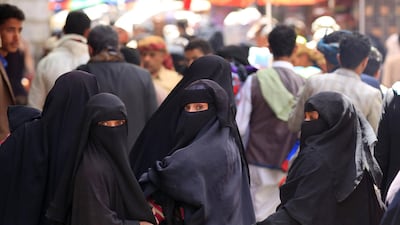The Houthis arrived without warning.
Heavily armed and in a furious mood, they barged into Ophelia, the only cafe for women in the Yemeni capital Sanaa, and demanded it be shut down immediately.
When owner Shaima Mohammed asked for a little time to allow her customers to gather their things, one of the militants snapped at her: “Women should be in their homes. Why are they going out in public?”
“Armed men filled the street, directing obscenities at the women as they left,” Ms Mohammed said on Facebook as she announced the cafe’s closure.
The incident, one of a series in the rebel-held north, illustrates the Houthis’ determination to impose their extreme ideology on Yemenis who have already endured five years of grinding conflict.
In recent months, restaurants where men and women mingle were shut down, scissor-wielding militia policed men’s hairstyles and rebel forces patrolled college campuses to enforce dress codes.
Much of the crackdown has been rolled out without any official decree or documentation, but reporters have seen a copy of a Houthi letter sent to non-government groups that illustrates the new mood.
“Exclude all activities that aim to stir laughter, joy or entertainment among the trainees, and that lead to the lowering of barriers and modesty between women and men,” it reads.
Yemen’s long war pits the Houthis, who are backed by Iran and control large parts of the north, against the internationally recognised government that has the support of the Saudi-led Arab Coalition.
The rebels’ attempt to take over what was already the Arab world’s poorest nation has killed tens of thousands and triggered what the UN calls the worst humanitarian crisis on Earth, with millions displaced and in need of aid.
“The situation in Houthi-controlled areas is getting tighter and tighter. People are scared,” said Nadwa Al Dawsari, a Yemeni conflict analyst.
Ms Al Dawsari told of women being harassed for wearing belts around their robes, with rebels tearing them off and saying the silhouette they create is too “exciting”.
“This is shocking for Yemeni society because it’s one thing to denounce certain behaviour and what people are wearing, and it’s another thing to go and abuse these women like the Houthis are doing,” she said.
“It goes against our tribal values, it goes against our Islamic values. The difference now is that Houthis can force it down the throats of people living under their control.”
The Houthi campaign collides with a society that, although conservative, traditionally allowed space for personal freedom and cultivated an appreciation of music and leisure, said Adel Al Ahmadi, a Yemeni academic.
The rebels, from the mountainous north, have proved a formidable fighting force since they swept into Sanaa in 2014, rallying behind their slogan: “Death to America. Death to Israel. Curse on the Jews.”
“It is an ideological movement,” Mr Al Ahmadi said.
Witnesses in Sanaa spoke of a rising number of disturbing incidents since late 2019, a period during which the Houthis interfered with UN attempts to deliver humanitarian aid.
On February 13, on the eve of Valentine’s Day, young people were beaten in the street for failing to comply with the new notions of acceptable dress.
Unlike the days before the conflict, when people were free to celebrate with chocolates and flowers, one young man had his red shirt torn off by assailants who saw it as a symbol of an event that runs counter to Yemeni values.
In January, men’s hair salons were told fashionable styles were banned.
Young men who fell foul of the rule with longer styles were hauled on to intersections where their locks were publicly chopped back with large scissors.
Another cafe owner in Sanaa said his establishment had been shut down twice in three months by armed rebels.
“We are completely opposed to these abusive measures and the restrictions being imposed on people in the capital,” the owner said.
Houthis have also campaigned in schools and on college campuses against young people being “improperly dressed”, said Hemdane Al Ali, a journalist and human rights activist who lives in exile.
At Sanaa University, they formed squads that “patrol the corridors to prevent any contact between students of different sexes”, he said.
“Young fighters go through months of training in the mountains, taught not only how to use weapons but also indoctrinated,” Ms Al Dawsari said.
“If you want to understand why Houthis behave in certain ways, you have to look at Iran. They’ve been trained by Iran, taught how to use disinformation, how to subjugate women.
“They’re developing a police state akin to Iran.”




















